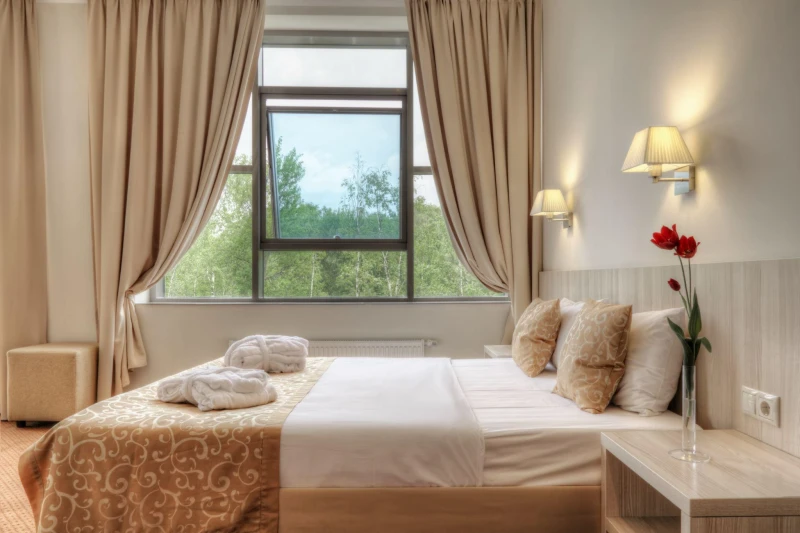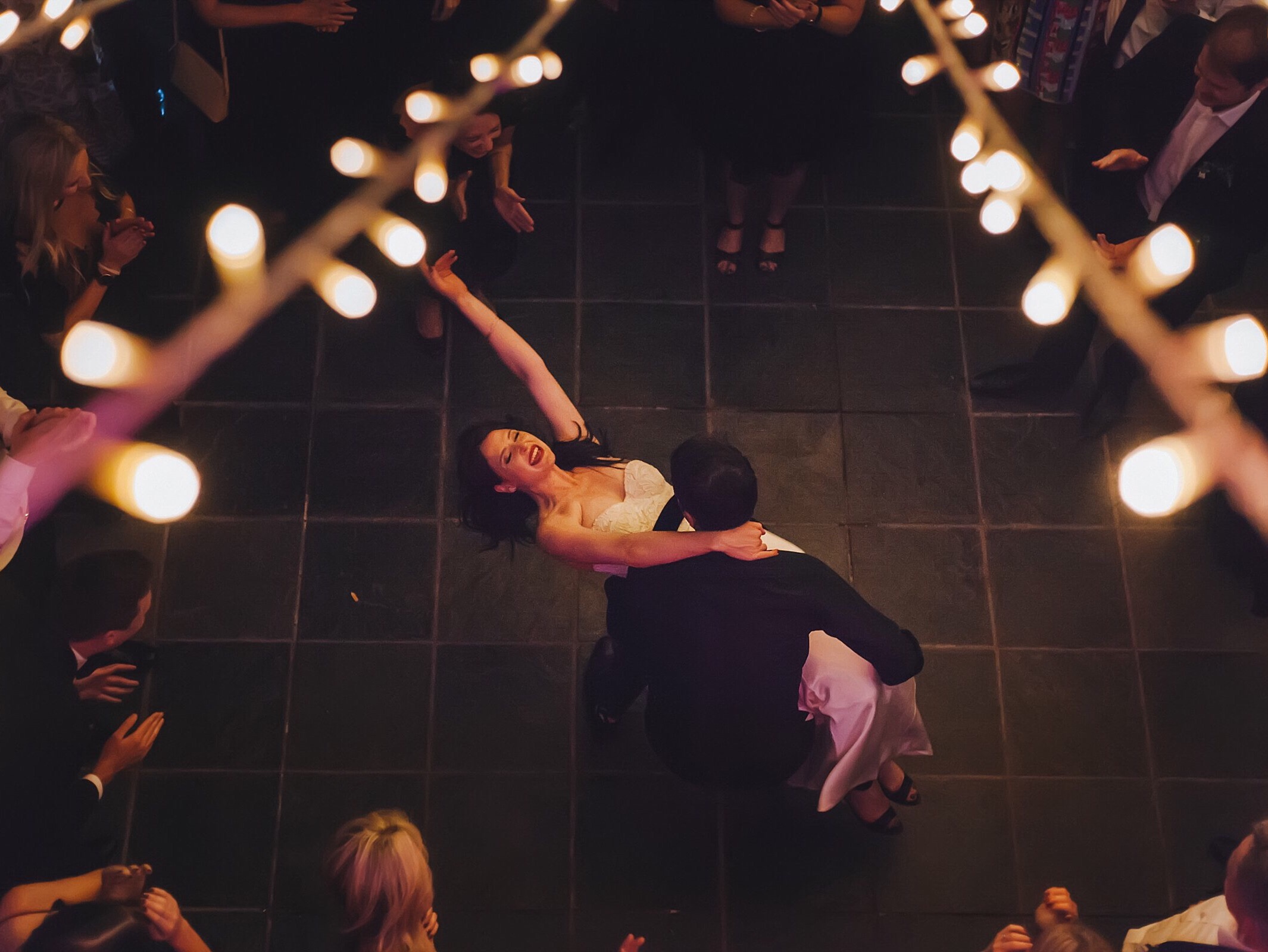
Having no knowledge of the language
Let me say this clearly, regardless of whether you're speaking with a sales manager at the hotel of your dreams or attempting to get this "not-so-important" thing off your to-do list as fast as possible. Never enter into a contract without doing your research. Each hotel will have its own terms and charges for things like fines for overbooking, fines for underbooking, and fees for extra amenities like welcome bags, deliveries, etc. Learn their language before you even start this dialogue with your sales agents.
Here are some of the key terms you need to be familiar with when dealing with hotels for your perfect wedding day:
Deposit: Hotels often need a predetermined deposit payment at the moment the contract is signed.
Cut-off: In most cases, hotels will establish a cut-off date, such as 30 days before the wedding. This refers to the last day that guests can reserve rooms in your block before they are made available for general public purchase.
Policy on Cancellations: It's crucial to be aware of the precise costs involved in canceling your room block for whatever reason. Ask to have the cutoff date be the final day you can cancel without incurring any costs if you are unable to negotiate a no-penalty cancellation condition. Make sure the contract includes a force majeure clause that describes what will happen if you need to terminate it due to an urgent situation that is completely beyond your control (sudden illness, death, weather, or any other act of God).
Clause for Allowed Shrinkage: The percentage of available rooms that can be empty. The percentage of rooms that must be occupied to avoid a fine (usually 80–90%) is known as the attrition clause. This fine could be the total amount of each room that was not reserved in order to meet your quota. It's a hotel's way of ensuring that they make the profit promised to them, and if it comes out of your wallet and not your guests, it's yours.
Resell/Mitigation Clause: After the cutoff date, the hotel is obligated to make an effort to sell the unoccupied rooms in your block. In this manner, you are absolved of responsibility for empty rooms that are subsequently rented out to other visitors.
Not making their expectations clear
Ask about any minor things you really must have when you're in the negotiation stage. They unfortunately are not always free. Hence, be informed of the hotel's policies + rates for services like turn-down treats, welcome bag drop-offs, special help to rooms, etc. to prevent a burden of a surprise close to your wedding day. As the hotel will be guaranteed a certain amount here, you might perhaps utilize these non-negotiable costs frequently to lower your deposit amount or other stipulations.
Being unwilling to request extras
Negotiating your room block entails more than just discussing the price. Ask for perks like free parking permits, free wifi for your guests, or even free room upgrades for you and your partner if you're also booking a stay at the hotel. A group rate can save you a lot of money, but these other savings options are frequently disregarded. Who doesn't want to save money for their perfect wedding day?
Not making enough preparations in advance
While it's possible to reserve hotel room blocks as soon as three months in advance, you shouldn't. It would be best to start this dialogue with several hotels as long in advance as possible. When most couples have a better idea of their guest count about eight months before the wedding, they begin to consider their possibilities (no pun intended). They can cast a wider net for lodging options in the area they want and at various pricing points. Also, you have more negotiation power when there are more hotels willing to compete on your behalf!

The idea that one size fits all
Giving your guests options is always a good idea because they will probably arrive with expectations ranging over a range of pricing ranges. Try to reserve rooms at two or three different hotels so they can pick the one with the ideal style, setting, pricing, etc. for them. On the other hand, couples that reserve too many accommodations for their visitors may wind up in sticky situations. You don't want to take the chance of having empty rooms, especially for a variety of hotels. Thus, we believe that 2-3 hotels are the golden number.
Taking on too many reservations
Although it shouldn't be a surprise this far down the list of bullet points, it is nevertheless important to mention. Couples will typically begin by booking 10 rooms in their block, though this can vary greatly depending on the number of guests and other factors. If it starts to fill up too rapidly, you can always raise your room block, so don't be afraid to overestimate your initial room count to be on the safe side.
Not taking distance into account
It counts for your event location, where you get ready, and particularly for your hotel room blocks! The recommended distance from your wedding site is no more than 10 miles or a 30-minute journey. Remember that many of your out-of-town visitors might not have a nice car while they are here. So, keeping it convenient is the greatest approach to guarantee that they have a memorable experience (in a good way). Especially better if you provide transportation from the hotels you've reserved to the location of the ceremony or if it's close by!
Ignoring local happenings
Let's face it, your wedding is the biggest event of the year. Yet it doesn't preclude these small events, such neighbourhood conferences, concerts, and conventions, from occurring over the weekend of your wedding. Hence, pay attention to what's happening in the area around the hotels you're considering since this will affect both availability and price increases for room rates.

Allowing visitors to resolve it on their own
We are extremely lucky to live in a time with so many different communication options. This also implies that you have no justification for abandoning your guests before the wedding! Put the information about your room block on your website because spreading it around will encourage people to support you. Add it to your invitations. Inform them of their options, ranges of prices, and locations by the cut-off date, what the rules are for transportation to/from the wedding (if applicable), how they should reserve a room in your block (should they just mention your name or do they have to follow a certain procedure), and even a heads-up if transportation to/from the wedding is not applicable! The last thing you want is for your guests to contact you throughout the week leading up to your wedding a worry about how their stay will go.
Failing to show kindness
In the end, you want to get along well with the hotels where you've reserved room blocks. Because of this, it's crucial to present a friendly and open front at all times, including during negotiations. Salespeople are merely performing their job duties, and these hotels will be the ones providing you with services throughout your celebration. If they love you, you might even receive a complimentary bottle of champagne in your room on the wedding night! You don't want there to be any ill will between you two.
Here are some tips for booking wedding hotels :
- Start Early: Wedding hotels can book up quickly, especially during peak wedding season. So, it's important to start your search early to secure your desired hotel and dates.
- Determine Your Budget: Set a budget for your wedding hotel and stick to it. Be sure to factor in all costs including room rates, taxes, and any additional fees.
- Consider Location: Choose a wedding hotel that is conveniently located for you and your guests. Consider proximity to airports, public transportation, and popular attractions.
- Ask About Packages: Many wedding hotels offer wedding packages that include everything from the venue, catering, decor, and accommodations. These packages can save you time and money.
- Check Reviews: Before booking a wedding hotel, read reviews from previous guests. This will give you an idea of the hotel's quality of service and amenities.
- Visit the Hotel: If possible, schedule a site visit to the hotel before booking. This will give you an opportunity to see the hotel in person, ask questions, and ensure that it meets your expectations.
- Negotiate: Don't be afraid to negotiate with the hotel on room rates or any additional fees. Many hotels are willing to work with you to find a package that fits your budget.
- Book Your Guests' Rooms: Make sure to book a block of rooms for your wedding guests at the hotel. This will ensure that everyone is able to stay together and will likely result in discounted room rates.




